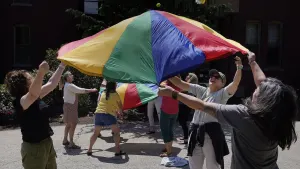More Stories
The delta variant of the coronavirus is still taking its toll across the country with 4 million confirmed cases of the virus being recorded in just four weeks.
The United States now has had more than 40 million confirmed COVID-19 cases and there has been a 160% increase in the number of people hospitalized with the virus now compared to this time in 2020.
Despite the trouble statistics, Dr. Anthony Fauci says there is a way to break the surge of new cases.
“We have 75 million people in this country who are eligible to be vaccinated who are not yet vaccinated,” Fauci says. “If we get the overwhelming majority of this vaccinated, we could turn this around even as we go into the cooler weather of the fall. It’s within our grasp.”
Emergency medicine specialist from Hartford HealthCare St. Vincent’s Medical Center Dr. Listy Thomas says the Northeast is reaping the rewards of having high rate of vaccination.
“Because of the immunity we have been able to obtain because of high rates of vaccination, we’re seeing a lot less of the struggles that we’re seeing in the South,” Thomas says.
She expects the federal government will start pushing boosters next week and people in the frontlines will be lining up to get it.
Meanwhile, millions of unemployed Americans lost their benefits this week.
The aid program provided aid to self-employed and gig workers, as well as giving benefits to those who have been unemployed for more than six months.
President Joe Biden’s administration’s $300 weekly supplemental unemployment benefits also ran out on Labor Day.
An estimated 8.9 Americans will lose all or some of the benefits.
President and CEO of the Health and Welfare Council of Long Island Rebecca Sanin says people who were struggling prior to March 2020 are now in crisis.
“It’s a lot of pain, a lot of fear and a lot of uncertainty,” Sanin says.
More from News 12
1:28

5 simple steps for long-term benefits to your health and heart
1:32

8 tips for working safely during hot weather
3:31

Guide: Ways to set your child up for financial success
3:18

Guide: The importance of good sleep and how to get it

Guide: Mental health resources available in the tri-state
9:36
